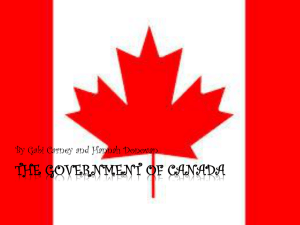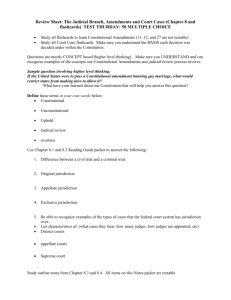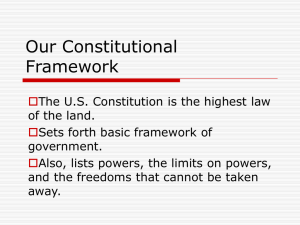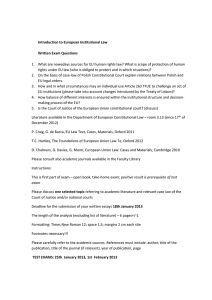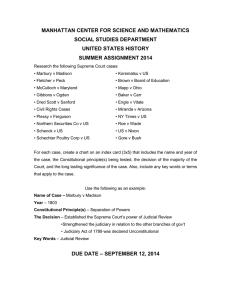“Legislators, Liberty and the Law: (Cour de cassation, 26 March 2003)
advertisement
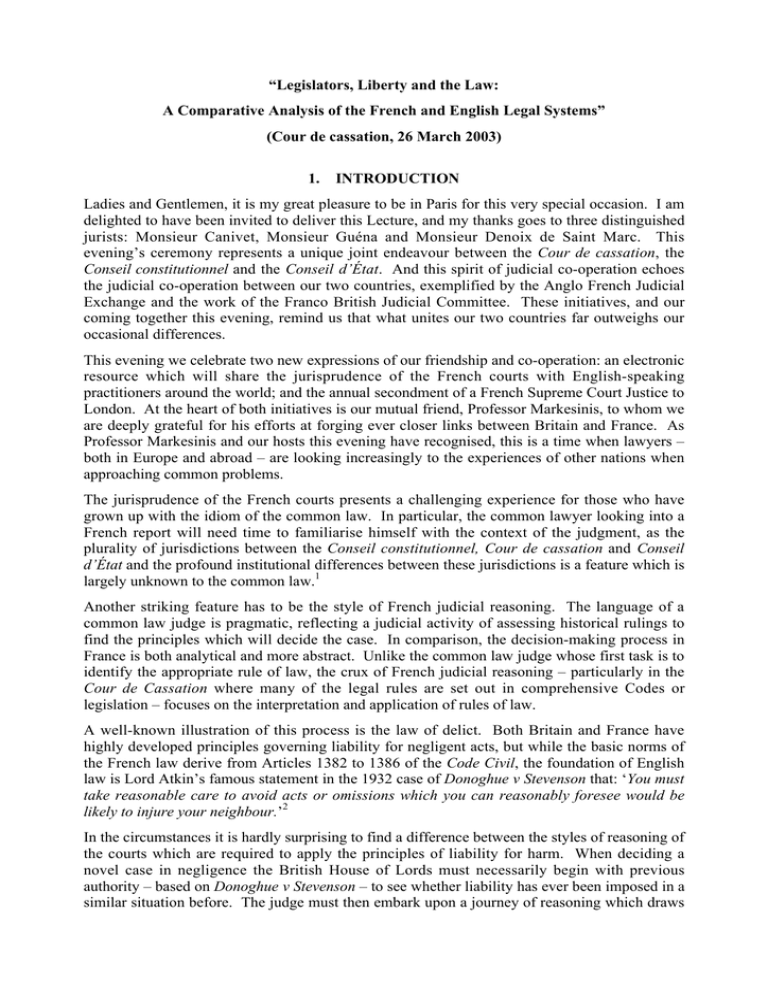
“Legislators, Liberty and the Law: A Comparative Analysis of the French and English Legal Systems” (Cour de cassation, 26 March 2003) 1. INTRODUCTION Ladies and Gentlemen, it is my great pleasure to be in Paris for this very special occasion. I am delighted to have been invited to deliver this Lecture, and my thanks goes to three distinguished jurists: Monsieur Canivet, Monsieur Guéna and Monsieur Denoix de Saint Marc. This evening’s ceremony represents a unique joint endeavour between the Cour de cassation, the Conseil constitutionnel and the Conseil d’État. And this spirit of judicial co-operation echoes the judicial co-operation between our two countries, exemplified by the Anglo French Judicial Exchange and the work of the Franco British Judicial Committee. These initiatives, and our coming together this evening, remind us that what unites our two countries far outweighs our occasional differences. This evening we celebrate two new expressions of our friendship and co-operation: an electronic resource which will share the jurisprudence of the French courts with English-speaking practitioners around the world; and the annual secondment of a French Supreme Court Justice to London. At the heart of both initiatives is our mutual friend, Professor Markesinis, to whom we are deeply grateful for his efforts at forging ever closer links between Britain and France. As Professor Markesinis and our hosts this evening have recognised, this is a time when lawyers – both in Europe and abroad – are looking increasingly to the experiences of other nations when approaching common problems. The jurisprudence of the French courts presents a challenging experience for those who have grown up with the idiom of the common law. In particular, the common lawyer looking into a French report will need time to familiarise himself with the context of the judgment, as the plurality of jurisdictions between the Conseil constitutionnel, Cour de cassation and Conseil d’État and the profound institutional differences between these jurisdictions is a feature which is largely unknown to the common law.1 Another striking feature has to be the style of French judicial reasoning. The language of a common law judge is pragmatic, reflecting a judicial activity of assessing historical rulings to find the principles which will decide the case. In comparison, the decision-making process in France is both analytical and more abstract. Unlike the common law judge whose first task is to identify the appropriate rule of law, the crux of French judicial reasoning – particularly in the Cour de Cassation where many of the legal rules are set out in comprehensive Codes or legislation – focuses on the interpretation and application of rules of law. A well-known illustration of this process is the law of delict. Both Britain and France have highly developed principles governing liability for negligent acts, but while the basic norms of the French law derive from Articles 1382 to 1386 of the Code Civil, the foundation of English law is Lord Atkin’s famous statement in the 1932 case of Donoghue v Stevenson that: ‘You must take reasonable care to avoid acts or omissions which you can reasonably foresee would be likely to injure your neighbour.’2 In the circumstances it is hardly surprising to find a difference between the styles of reasoning of the courts which are required to apply the principles of liability for harm. When deciding a novel case in negligence the British House of Lords must necessarily begin with previous authority – based on Donoghue v Stevenson – to see whether liability has ever been imposed in a similar situation before. The judge must then embark upon a journey of reasoning which draws out principles from the earlier cases imposing liability and decides whether they are relevant to the present facts. As Lord Hoffmann recently said: ‘The [House of Lords] approaches the question … starting with situations in which a duty has been held to exist and then asking whether there are considerations of analogy, policy, fairness and justice for extending it to cover a new situation… The trend of authorities has been to discourage the assumption that anyone who suffers loss is prima facie entitled to compensation from a person … whose act or omission can be said to have caused it. The default position is that he is not.’3 The role of the Cour de cassation is very different. Its judges are not required to reason from past authority but rather from the terms of the Code Civil itself, and this requires a very different analytical process. In the celebrated arrêt Jand’heur4 the Cour de cassation formulated a remarkable branch of jurisprudence: the liability for ‘les actes des choses’ based on Article 1384 of the Code Civil. The judgment does not in any way reflect the historical approach of the British courts, but starts from an analytical interpretation of Article 1384 as the foundation for liability: ‘Attendu que la présomption de responsabilité établie par cet article à l'encontre de celui qui a sous sa garde la chose inanimée qui a causé un dommage à autrui ne peut être détruite que par la preuve d'un cas fortuit ou de force majeure ou d'une cause étrangère qui ne lui soit pas imputable … … attendu que la loi, pour l'application de la présomption qu'elle édicte, ne distingue pas suivant que la chose qui a causé le dommage était ou non actionnée par la main de l'homme ; qu'il n'est pas nécessaire qu'elle ait un vice inhérent à sa nature et susceptible de causer le dommage, l'article 1384 rattachant la responsabilité à la garde de la chose, non à la chose elle-même… Par ces motifs, CASSE’5 This short and analytical style of judicial reasoning, so very different from the approach of the common law, can often complicate the process of comparison between legal systems. However, the problem is not an insurmountable one. Differences in analytical style are commonplace even as between national institutions: the interpretative approach of the Cour de cassation is in principle quite different from that of the Conseil d’État and quite different again from that of the Conseil constitutionnel. And, the published reports of the opinion of the Avocat Général of the Commissaire du Gouvernment are rather longer and more similar to an English judgment. So now that British and French lawyers have greater facilities than ever before with which to investigate their mutual jurisprudence, there is surely a great deal which lawyers on both sides of the Channel can learn from their common experience. This evening, I will explore some of this common experience and investigate more closely the ways in which the two systems have reached similar solutions to mutual problems. 2. CONSTITUTIONAL LAW No comparative exercise can proceed without an understanding of the basic legal framework, so let me begin with an overview of the constitutional arrangements of Britain and France. 2.1 Legislative and common law constitutionalism At first glance this is not an easy task, as differences appear more obvious than similarities. Even the most basic source of French constitutionalism – the written Constitution of 19586 – finds no parallel in British constitutional arrangements. To divine the principles of the British Constitution we must turn to precedent. The most fundamental rules – including the principle that ultimate legal sovereignty vests in Parliament7 – derive from judicial decisions rather than any instrument of constitutional legislation.8 Indeed, many important aspects of the British Constitution are not rules of law at all, but simply aspects of custom and practice. For example, there is no legal rule which expressly creates the office of Prime Minister. The matter is left to convention, and whilst any departure from this convention would be practically inconceivable there is no positive rule to this effect.9 2.2 Constitutional commonalities – the shared libertarian tradition Amidst this picture is it even possible to find a basis for constitutional comparison between Britain and France? The answer is surely yes. Both countries are strong parliamentary democracies founded on the rule of law and with long experience of protecting basic rights. When we look beyond the structural and stylistic factors, what emerges is a clear common heritage of constitutional democracy and respect for basic rights. In France, fundamental rights have provided a basic foundation of constitutionalism since the revolutionary Déclaration des Droits de l’Homme et du Citoyen of 26 August 1789. This document was a triumphant product of the revolution, and like the American Declaration of Rights thirteen years before10 it heralded a modern era based on the self-evident truth that: ‘L’ignorance, l’oubli ou le mépris des droits de l’homme sont les seules causes des malheurs publics et de la corruption des gouvernements.’11 The principles of the Déclaration have since been reaffirmed and supplemented by a range of constitutional measures, including the political, economic and social principles of the Constitutional Preamble of 1946. The principles form part of the Bloc de Constitutionnalité which, in combination with international treaties and domestic legislation, have been powerfully developed by the French Courts to elevate rights to supreme legal status within France. The recognition of rights has also been an overriding feature of British constitutionalism. As in France, statements of right such as Magna Carta in 1215 and the Bill of Rights in 1689 form a vital part of British constitutional history. More recently, the Human Rights Act 1998 – a subject to which I will return shortly – has incorporated the principles of the European Convention on Human Rights directly into British law to ensure that they are protected across the ambit of governmental activity. For the identification of rights in Britain we must also look to the courts. Writing in the 13th century, the English jurist Bracton declared that ‘the King shall not be subject to men, but to God and the law: since law makes the King’.12 In this way, by subjugating government to the rule of law, the English courts have carved out a prominent role in identifying and upholding the basic rights of man. There is no more powerful illustration of this process than our historic decision, Entick v Carrington.13 In 1765, the Secretary of State suspected a man of plotting against the government. Believing himself to have unlimited powers ‘for the purpose of quieting clamours and sedition’, the Secretary of State ordered two of the King’s messengers to break into the man’s house and seize his papers. The court struck down the Secretary of State’s actions as a violation of basic constitutional principle. In a strongly libertarian judgment, Lord Camden said: ‘What would the Parliament say if the judges should take upon themselves to mould an unlawful power into a convenient authority, by new restrictions? That would be, not judgement, but legislation… And with respect to the argument of State necessity, or a distinction that has been aimed at between State officers and others, the common law does not understand that kind of reasoning, nor do our books take notice of any such distinction.’14 The judgment in Entick v Carrington has assumed an importance which is in many ways comparable with the 1789 Déclaration. Its libertarian ideology has influenced not only British constitutional arrangements but also common law constitutions around the world. History tells us that Thomas Jefferson had the case in mind when framing the Constitution of the United States, saying that its inherent liberalism – the concept of equality between men – espoused precisely the philosophy that the War of Independence had sought to achieve.15 Looking closely, there are some differences between the philosophy of Entick v Carrington and the principles of the 1789 Déclaration. Whilst the Déclaration lists the positive rights of man, Lord Camden did not refer to any positive rights at all. In substance, of course, the judgment upheld a range of basic rights – the right to privacy, the right to freedom of conscience and expression, the right to have a fair hearing before a competent court. Yet the judgment approaches libertarianism as a blanket concept, under the principle that all liberties are sacrosanct unless an instrument of law provides otherwise. 2.3 Reducing the divide – recent trends towards convergence This difference of emphasis is significant – it illustrates that English and French constitutional thinkers have to some extent approached the issue of rights protection from different perspectives. Yet the importance of this different emphasis as a matter of constitutional history should not be exaggerated. From the time of the Déclaration in 1789 we can clearly see the picture of a common constitutional heritage based on libertarian ideals. Indeed, if we look to more recent Anglo-French jurisprudence we can see that any difference of emphasis is more philosophical than real. A common approach to the protection of rights and an increasing convergence of constitutional principle can be seen in two aspects of modern Anglo-French constitutionalism. On the one hand French constitutional doctrine – despite its legislative origins – is showing an ever-more prominent reliance upon judicial precedent for the identification and enforcement of general libertarian principles. On the other hand, English constitutional doctrine – despite its historical reliance on precedent – has recently moved strongly towards the legislative identification and protection of rights. 2.3.1 The role of precedent in shaping French constitutional law As we have already seen, the basic principles of French constitutionalism have been carved out largely by the legislature, in the form of declarations of right following years of Revolution and World War. However, to say that the legislature has been uniquely responsible for upholding the rights of man would fail to do justice to the work of the French judiciary, particularly the recent jurisprudence of the Conseil constitutionnel. It is well known that the Conseil constitutionnel was not expressly created as a supreme court for the protection of rights. Established amidst De Gaulle’s presidentialising reforms of 1958, the Conseil was set up primarily to stand between Parliament and the Government, supervising the precise constitutional allocation of functions and ruling on constitutional competence when required. Yet the Conseil’s decision of 16 July 1971 about freedom of association radically altered this perception.16 In a landmark judgment the Conseil held that Article 61 of the Constitution empowered it to rule not only on the form of proposed legislation, but also on whether such legislation complied with the substance of French constitutional values. Any proposed law which was incompatible with French constitutional principle – including the basic rights of man as proclaimed in the 1789 Déclaration and the social values set out in the 1946 Constitutional Preamble – could be struck down before promulgation as a violation of the Constitution. This decision has often been described as a judge-led constitutional revolution,17 and it has given rise to a substantial body of jurisprudence for the furtherance of basic rights in the face of proposed legislative infringements. Not only has the Conseil protected the basic liberties set out in the 1789 Déclaration, such as the decision of 12 January 1977 striking down proposed legislation granting sweeping powers of stop and search to the police,18 but in other decisions its jurisprudence has far surpassed these basic freedoms and devised a sophisticated body of constitutional rights drawn from la tradition republicaine. One example is the decision of 16 January 1982, when the Conseil ruled that nationalisation measures, providing unequal compensation for proprietors, contravened constitutional principles on rights to property, fairness and equality. The judgment contains a general statement of the right to property, set in this constitutional context: ‘Les principes énoncés par la Déclaration des Droits de l’homme ont pleine valeur constitutionelle tant en ce qui concerne le caractère fondamental du droit de propriété dont la conservation constitue l’un des buts de la société politique et qui est mis au même rang que la liberté, la sûreté et la résistance à l’oppression … [L]a liberté qui, aux termes de l’art.4 de la Déclaration, consiste à pouvoir faire tout ce qui ne nuit pas à autrui, ne saurait elle-même être préservée si des restrictions arbitraires ou abusives étaient apportées à la liberté d’entreprendre.’19 Another illustration of the Conseil’s sophisticated rights-based jurisprudence comes from the decision on President Mitterand’s proposed Amnesty Acts of May 1988. In rejecting the proposition that an employer could be forced to take back an employee who had been dismissed for violence in the workplace, the Conseil set out a range of principles concerning the underlying laws of the Republic deriving from la tradition républicaine: ‘La contrainte qu’une telle réintégration ferait peser sur l’employeur qui à été victime de cet abus ou qui, en tout cas, n’en est pas responsable exéderait manifestement les sacrifices d’ordre personnel ou d’ordre patrimonial qui peuvent être demandés aux individus dans l’intérêt général … et que de telles dispositions dépassent manifestement les limites que le respect de la Constitution impose au législateur en matière d’amnistie.’20 The powerful jurisprudence of the Conseil constitutionnel is a useful illustration of the importance of the judicial function in identifying and protecting basic rights, which in modern times has proved as prominent in France as in the judge-led English system. 2.3.2 The identification and protection of positive rights in the British constitution At the same time, recent developments in British constitutionalism have illustrated the importance of Parliament working together with the courts to achieve fundamental libertarian ideals. In the courts, judges have strengthened the libertarian principles of Entick v Carrington by seeking to identify a broad range of positive rights with constitutional status. A striking example is a decision of the House of Lords in 1999, in which a number of prisoners successfully challenged a government policy of preventing visits by professional journalists.21 At the heart of the prisoners’ case lay two constitutional rights – the right to freedom of expression and the right of access to justice – which found powerful expression in the judgment of Lord Steyn: ‘One cannot lose sight that there is at stake a fundamental or basic right, namely the right of a prisoner to seek through oral interviews to persuade a journalist to investigate the safety of the prisoner's conviction and to publicise his findings in an effort to gain access to justice for the prisoner.’22 The British Parliament has also taken an active role in this process. In 1998 the Human Rights Act was passed, incorporating the European Convention on Human Rights directly into British law and providing a legislative source of basic rights across the United Kingdom. While judicial interpretation has remained key to defining the scope of these rights, the importance of the Human Rights Act has been to provide judges with a single source of rights, enacted by a democratic legislature. The Human Rights Act operates on a number of fronts. It imposes a positive obligation on public bodies to uphold the fundamental rights set out in the European Convention.23 It also requires courts to interpret legislation, so far as possible, in a manner consistent with Convention rights.24 And if an Act is clearly inconsistent with the principles of the Convention then the court should issue a ‘declaration of incompatibility’.25 This does not affect the continuing validity of the legislation, but triggers Parliament’s power to pass fast-track remedial orders or amending legislation brought before it by the Government, in response to the declaration.26 Finally, the Act subjects Ministers to new duties, requiring them to make written statements that their proposed legislation complies with the basic principles of the European Convention.27 Inevitably, there are some subtle differences of approach between the operation of the Human Rights Act and the recent jurisprudence of the Conseil constitutionnel. First, the source of rights is obviously different because the Human Rights Act refers to the European Convention to define the types of basic right which are protected. More fundamentally, the British system of constitutional rights-based challenge is reactive, not pro-active. The Act does not set up a special jurisdictional order to be compared with the functions of the Conseil constitutionnel. Rather, it envisages that constitutional challenge to legislation will arise in the course of ordinary litigation before the ordinary courts whenever a party’s basic rights have been infringed by legislation. And, whilst a common law court has the power to issue a ‘declaration of incompatibility’ requiring government to consider amending the offending provision, the ultimate decision on the content of legislation remains vested in Parliament. 2.4 Conclusion It is fair to say that the constitutional traditions of Britain and France have traditionally displayed some disparities of style, and in light of their different historical experiences it is hardly surprising that some differences of constitutional doctrine remain today. However, while we can highlight differences in application, it is clear that the two nations share a common constitutional heritage based on the primacy of the rights of man. This heritage is surely strengthened by the enactment of the Human Rights Act, whose clear legislative statement of rights does much to bring British and French constitutional arrangements closer together. As with the French Constitutional Preambles, the Human Rights Act has provided the British legal system with a clear legislative statement of fundamental rights which carries genuine democratic credentials. 3. ADMINISTRATIVE LAW 3.1 The structural divide Let me turn now to the principles of administrative law, as this is the field of litigation where constitutional rights most often fall to be considered. As with constitutional comparison, the consideration of administrative law in France and Britain leads us immediately to a major structural divergence.28 A British lawyer takes for granted the proposition that government is subject to the control of the common law courts, yet this proposition is directly contrary to the statement of principle which underpins French administrative law: ‘Les fonctions judiciaires sont distinctes et demeureront toujours séparées des fonctions administratives. Les juges ne pourront, à peine de fortaiture, troubler de quelque manière que ce soit, les opérations des corps administratifs, ni citer devant eux les administrateurs par raison de leur fonction’.29 This statement – contained in Article 13 of the Law of 16 August 1790 – was a direct product of Revolution. It epitomised the revolutionary imperative of establishing a new system of government which was free from the interference of the unpopular Ancien Régime. It summed up also the thinking later espoused by De Tocqueville that the republican government should acquire the same inherent power of governance which formerly belonged to the King. But at the same time Article 13 reflected the basic premise – maintained today by Article 3 of the 1958 Constitution – that national sovereignty and the exercise of governmental power belonged above all else to the people of France. In many ways the British experience could not be more different. As I have mentioned, Bracton’s assertion in the 13th century that ‘the King shall … be subject to … God and the law: since law makes the King’30 was taken up by an active and interventionist judiciary. As early as the sixteenth century the English courts had devised an effective system of control which allowed ordinary litigants to begin proceedings in the name of the Crown to seek review of improper governmental action. The remedies available in such proceedings – the ancient writs of prohibition, mandamus and certiorari – would enable the court to make binding orders requiring specific conduct on the part of the Crown. 3.2 Commonalities behind the divide Much has been made of this structural divide and the way in which it highlights the different constitutional experiences of the two nations. In addition there are differences of terminology, and the term ‘administrative law’ in France embraces not only the judicial supervision of government (as in Britain) but also the rules controlling public liability for wrongs which in Britain are not defined as administrative law at all. However, if we look to the area where the terminology does display consistency – the judicial control of government – the structural divisions should not close our eyes to some basic commonalities between Britain and France. 3.2.1 Government according to law First, we should note that judicial review is a central feature of constitutional arrangements in both countries, notwithstanding the differences of constitutional structure to which I have referred. Fundamentally, powers of judicial review – however they are implemented – have arisen as a vindication of the principle that government must be conducted according to law. Indeed, when we look more closely at the jurisprudence of the Conseil d’État and of the British Courts it is clear that jurisdictional control – the courts’ insistence on identifying the source of governmental power – is central to both systems. Just as in Entick v Carrington Lord Camden ruled that the ‘argument of state necessity’ counted for nothing in the absence of clear legal powers, so in France the Conseil d’État is sure to strike down any act which is not founded upon a legitimate base légale. A clear example of the operation of jurisdictional control in Anglo-French administrative law emerges from comparing the decision of the French Conseil d’État of 25 April 199431 with the ruling of the British House of Lords in Wheeler v Leicester City Council in 1985.32 In its decision the Conseil d’État was asked to consider the legality of a local authority’s decision to finance a leaflet opposing ratification of the Maastricht Treaty. The Conseil held that the decision was unlawful – local authorities have no responsibility for international affairs and in the absence of any recognised base légale the proposed measure had to fail. This use of jurisdictional control to uphold the rule of law is closely paralleled by the decision of the House of Lords in Wheeler. There, a local authority withdrew access to public facilities from a local rugby club which had decided to play in South Africa during the time of apartheid. In formal terms the local authority had control over its public facilities. However, the House of Lords ruled that the local authority had no legal basis for imposing politically motivated punishments. 3.2.2 Separation of powers Another fundamental doctrine underpinning the law of judicial review in both France and Britain is the separation of powers. This doctrine sets up a delicate constitutional balancing act. It requires those who are charged with the power of governmental supervision to give effect to the rule of law by protecting the rights of individuals against governmental encroachment. But at the same time it elevates the democratic imperative of respecting the acts of an elected legislature. The administrative courts must therefore set clear boundaries that are sensitive to the dangers of usurping the executive or legislative function.33 This is a particular concern in Britain, where the powers of controlling administrative conduct vest in the judicial branch of government under a procedure which is itself described as ‘judicial review’.34 In order to keep their constitutional role within proper limits, British courts must apply a number of doctrines, including strict rules of standing to ensure that the enforcement of rights is only effected by those directly concerned.35 The courts also maintain a distinction between the concepts of appeal, under which the court can substitute its view for that of the decision-maker, and review, under which the court examines only the legality of the decision. By this distinction the courts ensure that, in judicial review, they examine only the legality, and not the merits, of administrative decisions.36 But the British Courts also employ variable standards of review. Where the administrative act under review affects fundamental rights, for example the right to life, the Court's scrutiny should be more intense.37 This principle is critical to the sensitive application of administrative law. On the one hand it allows courts to intervene strenuously whenever the legality of a governmental act is in question, particularly whenever the rights of individuals are in issue. On the other hand it ensures a fair constitutional balance by keeping government policy outside the judicial domain. So in 1991 when a number of local authorities sought to challenge the government’s policy on restraining local authority taxation and expenditure, the House of Lords refused to intervene on the basis that the decision raised sensitive issues of national economic policy and any challenge would amount to improper judicial interference in the political process.38 Similar principles are at work in French administrative jurisprudence. Of course, French administrative law does not recognise a clear structural separation between the executive and the judiciary. Whilst the Conseil d’État exercises a judicial function, in its ultimate supervisory authority over executive conduct, in structural terms it remains part of the executive branch. Yet the jurisprudence of the Conseil d’État shows a clear concern for the dangers of illegitimate interference with executive decisions. As with the British courts, the Conseil d’État applies a variable standard of review, allowing decision-makers a broad scope of discretion in matters of public policy but considerably restricting their margin of latitude in cases involving fundamental rights. For example, in Benjamin the Conseil quashed a ban which had been imposed on a public speaker in violation of his right to free expression.39 Although the authority had imposed the ban because of real concerns for the maintenance of public order, the Conseil would not permit these concerns to prevail over the right to free expression unless they were of a very serious character. The concept of variable standards of review illustrates the courts’ awareness of the separation of powers and the sensitivity of interference in governmental action. Notwithstanding the profoundly different regimes of administrative control in Britain and France, we can see that the risk of undue interference is a sensitivity common to both jurisdictions. 3.3 Two different perspectives underpinned by common principles Yet this is not the only similarity of substance between the rules of French and British administrative law. To give another example, both systems maintain the importance of procedural fairness as expressed in the British concept of natural justice and the French droits de défense. Also the doctrines of erreur de droit, faits matériellement inexacts and qualifications juridique des faits find close parallels in the English rules governing errors of fact and law.40 Indeed, as with constitutional law, a close analysis looking beyond the initial structural differences shows that the founding principles of administrative control in France and Britain may not be as different as they first appear. It is true that in Britain the executive is subject to the jurisdiction of the ordinary courts whilst French government falls within its own entirely distinct jurisdiction. It is also true that this difference of practice highlights what was – at least two hundred years ago – a very different perception of the way in which governmental control should best be implemented. But looking deeper into the equation, we can see that the rules defining the control of government are motivated by similar concerns in England and France alike. On both sides of the Channel these largely judge-made rules show some striking commonalities of substance. 4. CONCLUSION This pattern of structural divergences, underpinned by basic substantive similarities, is a pattern which can be seen in many areas of Anglo-French jurisprudence. Indeed, the localising influences which have often been responsible for this historical divergence are diminishing.41 The problems that will confront Anglo-French law in the twenty-first century are no longer parochial; they are of international proportions. Old legal and constitutional values will have to be developed to encompass issues such as genetic reproduction and regulation of the Internet, and mutual guidance will inevitably be sought between nations. The House of Lords is already beginning to look to European experience with regularity when interpreting basic rights,42 and this tendency can only be expected to increase with the progressive convergence of cultural and scientific influences across the world. Perhaps the strongest impulse towards convergence is our countries’ common membership of the European Union. The direct applicability of Community law now means that national courts on both sides of the Channel must look to each others’ jurisprudence when seeking to implement the same law according to the same criteria. In the direct interpretation of Community law and indeed national legislation implementing rules of Community law, courts are beginning to define with ever greater precision the points of difference and accord among the various Community systems. For example, in a recent House of Lords case, the House was asked to interpret the Unfair Terms in Consumer Contracts Regulations, the British legislation passed to give effect to the Community Directive on Unfair Terms in Consumer Contracts.43 Giving judgment, Lord Steyn acknowledged the need for harmonised European interpretations of Community legislation and referred to the comparative studies of the Commission of European Contract Law to explain that ‘the purpose of the provision of good faith and fair dealing is to enforce community standards of decency, fairness and reasonableness in commercial transactions’.44 This type of exercise shows that the comparison of European jurisprudence is not just a point of academic interest but a practical necessity. That is why the initiatives we are celebrating this evening are critical. They will help the legal systems of France and Britain to build upon the commonalities between their past and present experiences, to enable them to share in the development of their joint futures. 1 This is a result of the Supreme Court of Judicature Act 1873, before which English law did recognise a plurality of jurisdictions. 2 Donoghue v. Stevenson [1932] AC 562 at 580 3 Stovin v Wise [1996] AC 923 at 949 4 Ch Reun. 13 Feb 1931 5 [full reference pending] ‘Given that the presumption of responsibility established by this article as established against a person who has control of an inanimate object which has caused harm to another can only be displaced by proof of fortuitous circumstances of force majeure or by an alternative cause for which he is not responsible…Given that the law, in applying the presumption which it requires, does not distinguish according to whether the object which caused damage was or was not operated by an individual, given that it is not necessary that there was an inherent defect liable to cause the harm, Article 1384 attaching liability to the keeping of the thing rather than to the thing itself…For these reasons [the Court] quashes [the first instance decision]’ 6 Together with the key documents to which this Constitution refers, namely the Constitutional Preamble of 1946 and the Déclaration des Droits de l’Homme et du Citoyen of 26 August 1789 7 Dicey, The Law of the Constitution, p39 [full reference pending] 8 See the review of earlier case law in Madzimbamuto v Lardner-Burke [1969] 1 AC 645 9 Dicey, The Law of the Constitution, p24 [full reference pending] 10 See P. Miller, The Life of the Mind in America (1965), pp.99-116 [full reference pending] 11 [full reference pending] ‘The ignorance, neglect or disregard of the rights of man are the sole causes of public grievances and of the corrupt practices of governments.’ 12 Bracton, quoted in F.W. Maitland, The Constitutional History of England (1908), p.100 [full reference pending] 13 Entick v Carrington (1765) 19 St Tr 1030 14 [reference pending] 15 M. White, The Philosophy of the American Revolution (OUP, NY 1978), Beitzinger, The Philosophy of Law of Four American Founding Fathers, (1976) 21 Am J Juris 1. See also O’Day, Understanding Comparative History: Britain and American from 1760, (Open University, 1997) 16 Cons Const 16.7.71, Rec.29 17 Article 61 of the Constitution now provides that sixty députés or sénateurs may refer proposed legislation to the Conseil, extending access for constitutional control of legislation to members of the opposition. 18 DS.1978.173 19 [full reference pending] ‘The principles stated in the Declaration of the Rights of Man have full constitutional force as regards the fundamental character of the right of ownership. The preservation of this right constitutes one of the goals of political society and the principle has the same status as the right to personal liberty, safety and freedom from oppression … [T]he freedom which, under Article 4 of the Declaration, grants a general freedom to do anything which does not cause harm to another, could not itself be preserved if arbitrary or abusive restrictions were imposed on freedom of business.’ 20 Cons Const 20.7.88, [1988] AJDA 752 ‘Such a reintegration would impose a burden on the employer who had been the victim of this abuse or in any event was not responsible. It would manifestly exceed the personal or proprietary sacrifices which can be demanded of individuals in the public interest… Such provisions manifestly exceed the limits which respect for the Constitution imposes on the legislator in the field of amnesty.’ 21 R v. Secretary of State for the Home Department, ex parte Simms [1999] 3 WLR 328 22 Ibid. at 340 23 s.6 24 s.3 25 s.4 26 s.10 27 s.19 28 See Dicey, The Law of the Constitution, 10th ed, 336, a caricature which has long been recognised as somewhat extreme: Wade & Forsyth, Administrative Law, 8th ed, 24 [full reference pending] 29 [full reference pending] ‘Judicial functions are distinct and will always remain separated from administrative functions. Judges may not – without abusing their authority – interfere in any way in the operations of the adminsitrative branch, nor summon members of the administrative branch by reason of their function.’ 30 Bracton, quoted in F.W. Maitland, The Constitutional History of England (1908), p.100 [full reference pending] 31 CE 25 April 1994, Président du Conseil Général du Territoire-de-Belfort AJDA 1994.545 32 [1985] AC1054 33 Lord Irvine of Lairg, Judges and Decision-Makers: The Theory and Practice of Wednesbury Review, [1996] PL 59 34 Lord Irvine of Lairg, Judges and Decision-Makers: The Theory and Practice of Wednesbury Review, [1996] PL 59 35 In Lujan v. Defenders of Wildlife, the US Supreme Court was faced with a challenge to environmental legislation brought by members of environmental lobby groups. They argued that a new Endangered Species Act should be extended to apply outside the territory of the United States. The petitioners were denied standing to challenge the decision, on the ground that their claim was “a generally available grievance about government” that should more properly be heard in a political arena, not a court of law. [full reference pending] 36 C.F. Forsyth, Of Fig Leaves and Fairy Tales: The Ultra Vires Doctrine, the Sovereignty of Parliament and Judicial Review [1996] CLJ 122 37 R v Secretary of State for the Home Department, ex parte Brind [1991] 1 AC 696 38 R v Secretary of State for the Environment, ex parte Hammersmith & Fulham LBC [1991] 1 AC 521 39 CE 19 May 1933, S 1933.3.1 40 Anisminic v Foreign Compensation Commission [1969] 2 AC 147; R v Hull University Visitor, ex parte Page [1993] AC 682 41 Kahn-Freund, Uses and Misuses of Comparative Law (1974) 37 MLR 1 42 See, for example, R v Secretary of State for the Home Department, ex parte Brind [1991] 1 AC 696 43 Council Directive 93/13/EEC (OJ 1993, L95, p 29) 44 Director General of Fair Trading v First National Bank [2002] 1 A.C. 481 at 500

